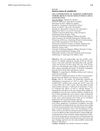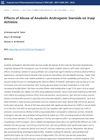 2 citations,
January 2021 in “Cureus”
2 citations,
January 2021 in “Cureus” Long-term anabolic steroid use can lead to heart and metabolic health issues.
 2 citations,
December 2020 in “Phytomedicine plus”
2 citations,
December 2020 in “Phytomedicine plus” Taking Saw palmetto and Pygeum africana can change the levels of certain steroids in urine, which could cause confusion in doping tests.
2 citations,
January 2017 in “Endocrinology” Testosterone and its metabolites have varied effects on different body systems, especially during puberty.
2 citations,
September 1971 in “Metabolism, clinical and experimental” Dihydrotestosterone has a reduced effect on muscle-building in people with testicular feminization syndrome, especially after their gonads are removed.
 March 2024 in “Egyptian Journal of Veterinary Science”
March 2024 in “Egyptian Journal of Veterinary Science” Nandrolone decanoate damages the heart, liver, and kidneys.
 August 2023 in “Medicina-lithuania”
August 2023 in “Medicina-lithuania” Abusing steroids can damage your heart, muscles, reproductive system, liver, skin, and brain, and may increase the risk of Alzheimer's disease.
 July 2023 in “The journal of sexual medicine”
July 2023 in “The journal of sexual medicine” Anabolic-androgenic steroids harm male hormone levels, sperm, metabolism, and can cause acne, hair loss, and breast growth.
January 2018 in “Medicinski pregled” Using high doses and multiple drugs with steroids is risky and should be prevented.
September 2017 in “Springer eBooks” Certain supplements, like whey protein isolate and growth hormones, can worsen hair loss.
 March 2017 in “Iraqi Journal of Pharmaceutical Sciences”
March 2017 in “Iraqi Journal of Pharmaceutical Sciences” Abuse of anabolic steroids in Iraqi athletes leads to negative effects on hormones, liver and kidney function, blood sugar, and cholesterol levels.
 11 citations,
May 2009 in “Medical Hypotheses”
11 citations,
May 2009 in “Medical Hypotheses” Male pattern baldness is an unintended side effect of the body's use of androgens for muscle growth, especially in those genetically prone to it.
61 citations,
September 1970 in “Journal of the American Geriatrics Society” Anabolic steroids may help prevent aging effects by reducing toxicity, not by their usual functions.
 25 citations,
June 2017 in “Molecular and Cellular Endocrinology”
25 citations,
June 2017 in “Molecular and Cellular Endocrinology” Using anabolic androgenic steroids can cause serious, lasting health problems in many parts of the body.
 7 citations,
February 2006 in “Clinical and Experimental Dermatology”
7 citations,
February 2006 in “Clinical and Experimental Dermatology” Using anabolic steroids 'Sus' and 'Deca' for bodybuilding caused severe acne in a man.
129 citations,
January 2004 in “Journal of medicinal chemistry” Researchers developed new compounds that target the androgen receptor effectively with fewer side effects.
 124 citations,
March 2012 in “JAMA”
124 citations,
March 2012 in “JAMA” Testosterone's muscle-building effects do not require its conversion to DHT.
 103 citations,
June 2006 in “British journal of sports medicine”
103 citations,
June 2006 in “British journal of sports medicine” The document concludes that better biomarkers are needed to detect long-term oral testosterone use in athletes.
 92 citations,
November 2003 in “The Journals of Gerontology”
92 citations,
November 2003 in “The Journals of Gerontology” Testosterone supplements can increase muscle mass and strength in older men with low levels, but long-term effects and risks need more research.
 72 citations,
October 1998 in “Baillière's clinical endocrinology and metabolism”
72 citations,
October 1998 in “Baillière's clinical endocrinology and metabolism” Long-term testosterone therapy can cause hormone suppression, affect prostate and heart health, and alter physical characteristics, but does not increase prostate cancer risk and needs more research for full risk assessment.
 55 citations,
July 1999 in “Clinics in Sports Medicine”
55 citations,
July 1999 in “Clinics in Sports Medicine” Athletes use steroids to enhance performance despite health risks and legal issues, and education on their dangers is needed.
54 citations,
October 2010 in “Clinics in dermatology” Diet, especially dairy and high-sugar foods, can cause acne.
 52 citations,
October 2016 in “Clinics in Dermatology”
52 citations,
October 2016 in “Clinics in Dermatology” Some medications can cause acne, and stopping these drugs is the main treatment.
 45 citations,
January 1998 in “Dermatology”
45 citations,
January 1998 in “Dermatology” Some skin conditions look like acne but are caused by drugs, and they usually get better when the drug is stopped.
 26 citations,
October 2014 in “Andrologia”
26 citations,
October 2014 in “Andrologia” Infertile men are more likely to produce sperm with abnormal chromosome numbers, which can affect pregnancy success and embryo health.
26 citations,
February 1978 in “Journal of Pediatric Surgery” Long-term TPN in children can cause zinc deficiency, leading to health issues.
 21 citations,
October 2011 in “British Journal of Dermatology”
21 citations,
October 2011 in “British Journal of Dermatology” Testosterone therapy helped 63% of androgen-deficient women grow scalp hair, but more research is needed.
 18 citations,
February 2016 in “The Journal of Clinical Endocrinology and Metabolism”
18 citations,
February 2016 in “The Journal of Clinical Endocrinology and Metabolism” Advancements in male reproductive medicine are ongoing, but more research and improved treatments are needed in several areas.
 18 citations,
January 2001 in “Annual Reports in Medicinal Chemistry”
18 citations,
January 2001 in “Annual Reports in Medicinal Chemistry” Selective Androgen Receptor Modulators (SARMs) are drugs that can control the effects of androgens in different tissues, potentially having fewer side effects and promising for treating various conditions.
 15 citations,
January 2016 in “Dermatologic Clinics”
15 citations,
January 2016 in “Dermatologic Clinics” Start acne treatment early to prevent scarring, consider antibiotic resistance, use maintenance therapy, and manage side effects carefully.
 14 citations,
January 2020 in “Dermatology Online Journal”
14 citations,
January 2020 in “Dermatology Online Journal” Some dietary supplements, like vitamins B6/B12, iodine, whey protein, and muscle-building products, can cause or worsen acne.






















